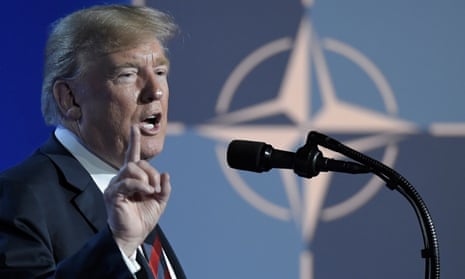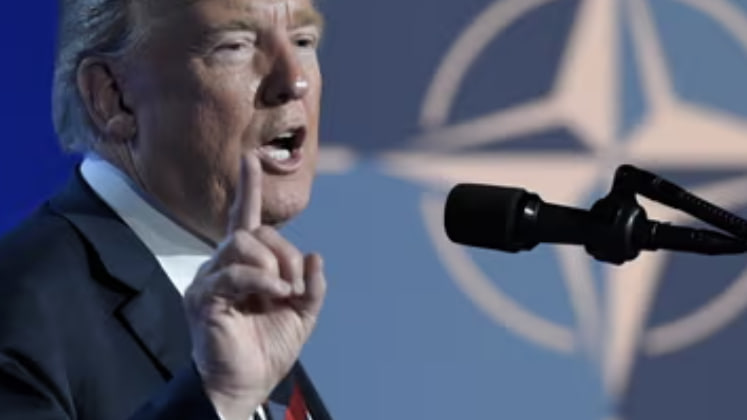Former U.S. President Donald Trump has come under scrutiny for using coarse language while speaking about the ongoing tensions between Israel and Iran. During an appearance with reporters following the NATO summit on June 24, Trump expressed frustration over renewed hostilities despite calls for a ceasefire.
Video footage of the exchange circulated widely on social media, in which Trump said both Israel and Iran had been “fighting so long and so hard that they don’t know what they’re doing.” His choice of words included an expletive that has drawn widespread commentary and criticism.

Background on the Israel-Iran Tensions
The exchange came as diplomatic efforts continued to address flare-ups between Israel and Iran. Relations between the two countries have long been adversarial, with Israel accusing Iran of backing militant groups hostile to it, such as Hezbollah and Hamas, while Iran has denounced Israeli airstrikes in Syria and elsewhere.
According to the United Nations, the region remains volatile, with periodic escalations raising concerns of wider conflict. UN Secretary-General António Guterres has repeatedly called for de-escalation and dialogue to prevent further violence.

Trump’s Remarks at the NATO Summit
During a brief exchange with reporters, Trump addressed questions about the status of a ceasefire. He claimed that the ceasefire agreement had been violated by both sides, stating:
“We have to have Israel calm down because it went on a mission this morning. I’ve got to get Israel to calm down.”
He added that he would try to speak to Israeli leadership to urge restraint.
While his comments aimed to acknowledge violations from both Israel and Iran, the use of strong, unscripted language led to headlines emphasizing his choice of words over the substance of the message.

Public Reaction and Political Fallout
Major U.S. media outlets reported on the incident, highlighting reactions that ranged from amusement to disapproval. Critics argued that the tone was inappropriate for a former U.S. president discussing such a sensitive topic, while supporters viewed it as a display of candor.
Trump’s communication style has long included blunt, unfiltered remarks, which have been a hallmark of both his presidency and post-presidential commentary.
Diplomatic Context
The exchange took place after the conclusion of a NATO summit where Middle East stability was one of the topics of discussion. While the summit focused primarily on European security and Russia’s actions in Ukraine, leaders also addressed regional flashpoints in the Middle East.
NATO does not have a formal role in brokering Israel-Iran relations. However, individual member states have urged calm. The U.S. State Department has consistently called for restraint from all parties in the region and emphasized the need for diplomatic solutions.

Clarification on Military Claims
Some social media posts have misleadingly suggested that Trump boasted about ordering direct U.S. military attacks that destroyed nuclear facilities in Iran. There is no official or reputable record to substantiate claims that the United States “eradicated” Iran’s nuclear sites during or after Trump’s term.
The main known sabotage incidents at Iranian nuclear facilities, such as the Natanz facility in 2020, have been widely attributed by analysts to cyberattacks or covert operations not publicly claimed by the U.S. government. Israel has been suspected in those cases but has not officially confirmed involvement.
The International Atomic Energy Agency (IAEA) continues to monitor Iran’s nuclear sites under safeguards agreements, and has reported damage from past sabotage but no “eradication” of all facilities.
Media Coverage and Social Media Reaction
News outlets covered the viral clip of Trump’s remarks, with many focusing on the unusual use of explicit language. Reactions on social media platforms included calls for greater decorum and criticism of Trump’s leadership style, as well as support from those who appreciate his direct approach.
Mainstream coverage emphasized the unusual nature of a former U.S. president using an expletive in an international context while addressing reporters.

Broader Implications for U.S. Diplomacy
While Trump’s comments were made in an unofficial capacity, they drew renewed attention to the difficulty of managing tensions between Israel and Iran.
Experts note that efforts to broker lasting peace have been hampered by longstanding mistrust and competing security concerns. The U.S. remains involved diplomatically, though it has limited direct influence over Iran, which has no formal diplomatic relations with Washington.
Meanwhile, Israel and Iran continue to view each other as strategic threats. Israel opposes Iran’s support for armed groups near its borders and has vowed to prevent Iran from developing nuclear weapons. Iran maintains its nuclear program is for peaceful purposes, though it has expanded uranium enrichment beyond limits set by the 2015 nuclear deal after the U.S. withdrew from the agreement in 2018.

Conclusion
Donald Trump’s remarks following the NATO summit illustrate the challenges of addressing complex international conflicts in the media spotlight. His use of coarse language drew attention away from the core diplomatic issue: ongoing violations of ceasefire understandings between Israel and Iran.
As international leaders continue to call for restraint, the episode underscores the importance of diplomatic communication, careful language, and sustained efforts to manage tensions in the Middle East.
Sources
-
United Nations News, “UN Chief urges restraint after latest escalation in Middle East,” 2024.
-
ABC News, “Donald Trump doubles down on tough talk about Iran, Israel ceasefire,” 2024.
-
Reuters, “Trump’s rhetoric on Israel, Iran draws mixed reactions,” 2024.
-
U.S. Department of State, “Briefing on Middle East Regional Security,” June 2024.
-
International Atomic Energy Agency (IAEA), “Safeguards Statement for Iran,” 2024.
-
BBC News, “What we know about attacks on Iran’s nuclear sites,” 2023.
-
CNN, “Trump’s blunt remarks about Israel-Iran conflict draw attention,” June 2024.
-
The Guardian, “Trump’s language overshadows ceasefire message,” June 2024.
-
U.S. Congressional Research Service, “Iran’s Nuclear Program: Status and U.S. Policy,” updated 2024.
